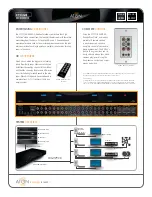
SCSI and I/O 8-87
Preventative Maintenance
Regular cleaning of the tape heads is essential to maintain the reliable operation and performance of the tape
drive. This procedure in NO WAY damages or shortens the life of either the drive mechanism or the tape
heads. The recommended cleaning frequency is every 25 hours of tape pulling time. You are advised not to
wait for the Cleaning Needed signal to appear on the front panel before implementing the cleaning
procedure. By the time the indicator is present, the performance of the drive may already have been
impacted.
Head Cleaning Procedure
Cleaning Cartridge Product Number = HP 92283K.
1.
Insert the cleaning cartridge into the drive.
2.
The drive automatically cleans the drive heads and ejects the cartridge after approximately 30
seconds.
3.
If the cleaning cartridge ejects after only 14 seconds, the cartridge has reached the end of its useful
life. (About 25 cleaning cycles.)
4.
If the cycle is successful, remove the cleaning cartridge and record the use count on the label
supplied with the cartridge.
Table 8-27
Recommended Cleaning frequency
Firmware Updates
Firmware updates can be done in two ways:
1.
Download new firmware files provided with the software or as patches. This method requires the
availability of a diagnostic or utility which allows for software controlled downloading of firmware.
2.
Update the firmware by way of a firmware upgrade tape available as an orderable part. The part
numbers for these tapes change on each new version release and will be made available by way of
service notes.
Firmware Upgrade Tape Procedure:
•
Shut down the operating system.
•
Clean the drive with the cleaning cartridge.
•
Insert the firmware update tape. The drive will now take over the activity and accomplish the update.
•
WAIT UNTIL ALL ACTIVITY HAS FINISHED before removing the update tape from the drive.
This is approximately two to three minutes.
Cartridge Use Per Day
Cleaning Interval
1
Weekly
2 or 3
Every other day
4 or more
Daily
Note
There can be no activity on the SCSI bus and no interruption of power during this procedure.
Either event can cause the device to become unusable (DEAD DRIVE) and will require the
device to be replaced.
Summary of Contents for 3000/9x9KS Series
Page 14: ...xiv Contents E Sources of Information on the Web ...
Page 28: ...2 8 Install and Configuration Figure 2 4 HP PB I O Slot Location Diagram Kx70 Kx80 ...
Page 44: ...2 24 Install and Configuration ...
Page 68: ...3 24 Troubleshooting HP 3000 Core I O Figure 3 4 HP 3000 Core I O ...
Page 120: ...5 6 Diagnostics ...
Page 128: ...6 8 Replaceable Parts Figure 6 4 Peripheral Bay Expanded View ...
Page 136: ...6 16 Replaceable Parts ...
Page 150: ...7 14 Removal and Replacement Figure 7 11 Peripheral Bay Rear View ...
Page 180: ...7 44 Removal and Replacement Figure 7 35 Cabinet Exploded View Rear ...
Page 209: ...SCSI and I O 8 21 Figure 8 3 A3629A ST19171WD J2 and J6 Jumper Settings ...
Page 217: ...SCSI and I O 8 29 Figure 8 7 A3353A source 2 J3 Jumper Positions ...
Page 218: ...8 30 SCSI and I O Figure 8 8 A3353A source 2 Option Connector Jumper Positions ...
Page 280: ...8 92 SCSI and I O Diagnostics CSTM SCSIDDS SYSMAP IOMAP ...
Page 298: ...8 110 SCSI and I O Diagnostics SCSICD IOMAP SYSMAP ...
Page 302: ...8 114 SCSI and I O ...
Page 308: ...Support Information B 2 HP 9x9KS Block Diagram Figure B 1 HP 3000 9x9KS Block Diagram ...
Page 309: ...B 3 Support Information HP K100 Block Diagram Figure B 2 HP 9000 K100 Block Diagram ...
Page 310: ...Support Information B 4 HP K2x0 K4x0 Block Diagram Figure B 3 HP 9000 K2x0 K4x0 Block Diagram ...
Page 311: ...B 5 Support Information Kx70 Kx80 Block Diagram Figure B 4 HP9000 Kx70 Block Diagram ...
Page 342: ...Memory Configuration Guidelines C 16 ...
Page 350: ...D 8 New System Features ...
















































